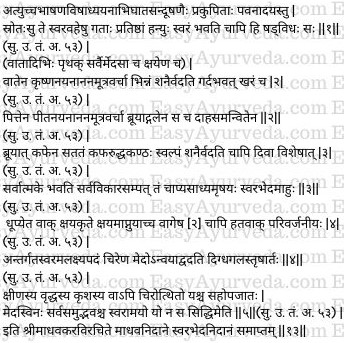Madhava Nidana Chapter 13 Swara Bheda Nidanam
This article explains Madava nidaana 13th chapter “Swara Bheda Nidanam”. Causes, pathology and symptoms of Swara Bheda are explained in this chapter.
Read – Acharya Madhavakara: His Work ‘Madhava Nidana’, Legacy, Amazing Facts

Table of Contents
Nidana
Etiological factors – Speaking in high pitch, effect of (consumption of) poisons, studying or reading loudly, injury and such other causes are considered to be the etiological factors of swara bheda – hoarseness of vata.
Samprapti
Pathogenesis – The above-mentioned etiological factors cause abnormal increase of vata and other doshas. These doshas in turn get lodged in the channels and organs responsible for production of voice and destroy the voice producing hoarseness of voice.
Read – Role of Vata Dosha And Its Types In Speech And Voice
Types
Types – Swarabheda is of six kinds, one from each dosha (vata, pitta and kapha), one from combination of all the three doshas (tridoshaja / sannipataja), the fifth type caused by medas (adipose tissue) and the sixth form of swarabheda is caused by ksaya (depletion of body tissues).(1)
The six types of Swarabheda are –
- Vataja Swarabheda
- Pittaja Swarabheda
- Kaphaja Swarabheda
- Sannipataja Swarabheda
- Ksayaja Swarabheda
- Medoja Swarabheda
Read – Hoarse Voice Causes, Ayurvedic Treatment, Home Remedies

Symptoms
Vataja Swarabheda Symptoms – The patient would have blackish discolouration of eye, face, urine and faeces. His voice is broken and he speaks slowly, with a harsh voice resembling that of a donkey.
Pittaja Swarabheda Symptoms – The patient would have yellowish discoloration of the eyes, face, urine and faeces. He would experience a burning sensation in the throat.
Kaphaja Swarabheda Symptoms – In this condition the throat of the patient is always obstructed by kapha (sputum, thick fluid). Due to this, the patient speaks slowly (indistinct, in low pitch). He can speak a little clearly during day time (the speech and voice are slightly better).
Tridoshaja / Sannipataja Swarabheda Symptoms – In this condition, all the symptoms of all the doshas coexist. According to the opinion of the great sages, this condition is incurable. (2-3)
Read – Kanthya Gana: Voice Improving Herbs: Review, Benefits, Formulations
Ksayaja Swarabheda Symptoms – In this type of hoarseness of voice, the patient feels as if hot fumes are coming out of the throat and nose, andas an impact of ksaya (depletion of tissues and destruction of nerves supplying the throat) the voice is completely destroyed. Such a patient who has completely lost his voice shall not be treated because it is incurable.
Medoja Swarabheda Symptoms – In this type of hoarseness of voice, the patient will have a coating of fat inside the throat or over the vocal nerves. As a result, the voice appears to be stuck within the throat (appears as though coming from great depth, from deep inside the throat). Whatever the person speaks is not clear. Some words (syllables) are clear and some are not clear and the person speaks slowly. The person will suffer from severe thirst in this condition. (4)
Read – Excessive Thirst – Ayurvedic Understanding And Treatment
Prognosis of Swarabheda
Swarabhedam is incurable in persons who are very weak, aged and emaciated. Also, swarabheda which is long standing or congenital, or that which occurs in persons who are obese and that which is produced by all the three doshas together (tridoshaja or sannipataja swarabheda) is incurable.(5)
Thus ends the chapter on Swarabheda Nidanam in Madhava Nidana text written by Acharya Madhavakara.











